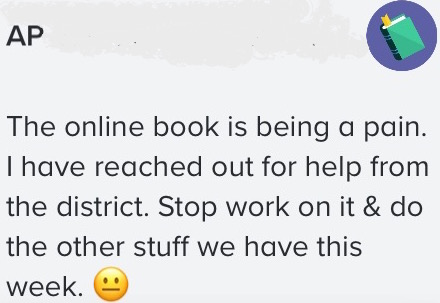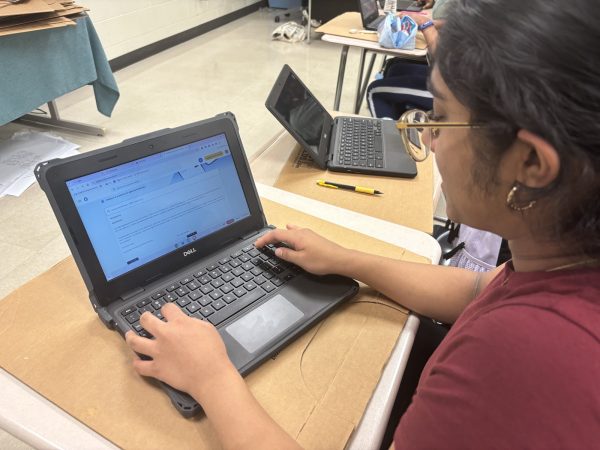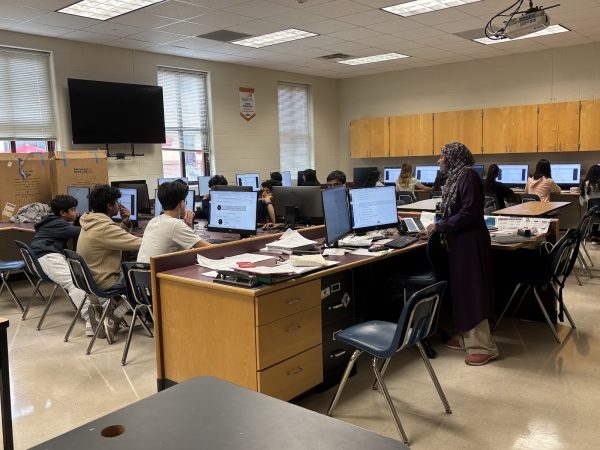The Terror of Online Textbooks

This was a remind message I recently received from one of my Ap Courses. Online textbooks are evidently frustrating for both students and teachers. A switch to former handheld textbooks may be more beneficial then expected.
I’ve always been the type of girl who loves having the physical copy of a book over the online edition. I love everything about real books, ranging from the simplicity for use to the access to the wondrous smell of freshly printed pages. As someone who has taken many AP courses in the past four years, I never had the time or the enthusiasm to grapple with lengthy access codes, website maintenance, and power/wifi outages. Moreover, I do not want to spend my youth hunched over a desktop, straining my eyes to attempt to understand the material before me.
Let’s face it. Forsyth County definitely has adequate funding to at least support the purchase of textbooks for our libraries. Time and time again there is a refusal to allocate our wealth on useful tools for education. In all honesty, taxpayers are unknowingly being cheated as their children won’t gain much information from online textbooks.
Primarily, children have to jump through all sorts of hurdles to even access the online textbook. Time in class is wasted as teachers have to talk their students through all the steps to apply a lengthy access code to a new account that must be created from scratch. In this process, troubleshooting issues with each individual student takes an obnoxiously long amount of time. Sometimes learning platforms and providers for the textbooks don’t even respond about how to resolve these issues.
Say you were one of the lucky few to get passed the initial barriers. Congratulations! Now you have to deal with an interminable amount of issues. Aside from the periodic website maintenance and malfunctions, in order to read this textbook you have to be able to deal with missing sections of the text, incorrect course material, gruesome tools used to annotate and highlight portions of the text. Continually you have to worry about shutdowns due to inclement weather and power outages.
Between these issues, teachers are subject to stress and unnecessary drama. Not all teachers are technological wizards who can make the problems disappear. In one of my former AP courses, the entire class was given faulty passcodes, yet we were expected to keep up with the text. Students repeatedly would file complaints with the teacher, but they were unable to provide adequate support as they had to continue on with the lesson plans regardless of these issues. Students’ grades began to suffer, and when the student body is unhappy, teachers always hear an earful about it.
Furthermore, teachers who already are busied with teaching the course material, grading papers, communicating with their students, and balancing their personal lives are expected to often do excess work to scan and send sections of missing text to each individual student. I have often heard teachers complain of this, and I genuinely feel sorry that they have to go to extensive lengths to provide good study materials for their students.
Ultimately, the victim is the reader. Students are prone to experience sleeplessness due to the blue light of screens. The straining of eyes to read course text could also result in long term damage to the eyes. The posture of the student is also impacted as students are forced to sit in one location for long periods of time, restricting any movement. A study done by a team in Norway in 2004 (as reported by WIRED ) found that reading on paper as opposed to reading text via PDF resulted in a greater performance and recollection of those who read on paper. Online novels and textbooks are evidently difficult for our brains to comprehend; however, those who read on paper retain information better through the page flipping action and physical motions involved with reading each page. A lack of comprehension and difficulty to retain information could result in extra stress, especially when students are expected to meet certain deadlines
Granted online textbooks may be easier to offer students in terms of affordability, but the risk obviously outweighs the benefit. Financing for adequate textbooks is an issue that can be solved with minimal effort required. In-school fundraisers will be most definitely able to provide for vital course materials. Teachers and students alike are both miserable as a result of these textbooks, and the progression of education is hindered amidst the limited time frame of the school year. It’s time we turn the power off, and actually pick up a book.
Your donation will help support The Lambert Post, Lambert High Schools student-run newspaper! Your contribution will allow us to purchase equipment and cover website hosting costs.












